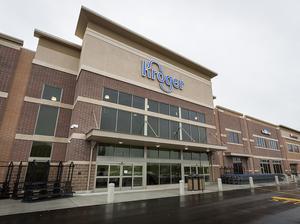
In his first earnings call after the Covid-19 pandemic hit, Fidelity National Information Services Inc. CEO Gary Norcross started off talking about the ways the Jacksonville-based company was taking care of its workforce. ¶ Then he pivoted to the impact the pandemic was having on the financial technology company’s business. ¶ “As we look to the future in our increasing implementation backlog, now more than ever, remote capabilities have become essential,” he said. “So, we’ve taken our cloud-based remote service model to the next level to provide the most robust, uninterrupted support available. Our remote delivery capabilities are proving invaluable.” ¶ Time has borne that out.
A year after that Q1 2020 earnings call, FIS saw its revenue grow 5% year over year, to $3.2 billion.
That included 3% growth in the company’s business of working with merchants — the company’s second-largest business behind providing banking software, and one that was bolstered by its 2019 acquisition of Worldpay.
That acquisition put FIS in the merchants solution business in a big way, with that sector going from an inconsequential fraction of the company’s revenue before the acquisition to around a quarter of its business after the deal.
It also set the company up for the “new normal” that has developed.
In the second quarter of 2021, FIS saw its revenues increase 17% to $3.5 billion, pushing net income to $0.55 per share. The merchant solutions business grew 45%, to $1.2 billion.
Over the past 16 months, the U.S. economy has seen a huge shift to e-commerce. While most of the attention has been on the companies that sell and the warehouses that store all of those goods we buy online, FIS has been quietly benefitting by providing the plumbing that handles many of those transactions — the result of strategic decisions made over the past several years that should continue to pay off in the future.
“From a long-term perspective, the pandemic could benefit the industry, as it appears to have accelerated consumers’ shift away from cash,” Morningstar Senior Analyst Brett Horn wrote in a July research note. “Additionally, we think part of the rationale for the [Worldpay] acquisition was to strengthen the company’s position in online payments. This area has become too large to ignore, and the pandemic and the resulting spike in online activity has only reinforced the importance of capabilities in this area.”
Now, FIS is looking to build on that growth, investing in new technologies and new products as the marketplace continues to change.
Building on banking
FIS’ history dates back to the 1960s, when it was founded as a company called Systematics. Bought by Fidelity National Financial in 2003 and then spun off as a separate company a year later, the company has expanded through a mix of acquisitions and organic growth.
One of the largest financial services technology companies in the world, FIS operates in three sectors, providing technology-related solutions to merchants, banks and capital markets.
The financial services industry was FIS’ focus until 2019, when the Jacksonville company acquired Cincinnati-based Worldpay in a $43 billion deal.
Since then, the focus has been on buying or building technology to serve those clients in an industry that has gotten ever more competitive, with FIS seeing several of its competitors make major acquisitions as well.
“The global payments industry is moving at an accelerated speed and it is vital that large providers such as FIS stay ahead,” IDC Financial Insights industry analyst Rivka Gewirtz Little said at the time of the merger. “The combination of FIS and Worldpay enhances FIS’ overall acquiring and payment offerings, positioning the company to offer best-in-class enterprise banking, payments, capital markets, and global e-commerce capabilities to financial institutions and businesses worldwide.”
Pandemic pivots
When the pandemic hit, grocery stores and retailers saw their businesses upended, including massive influxes of online transactions.
Those merchants use companies like FIS to move money from the customer’s bank to the store’s account.
“You know when you’re walking into a store, and you’re dipping or swiping your card?’’ said Nicole Jass, head of FIS’ North American Merchant products and solutions. “What you don’t know is that – or what I didn’t know before I joined this company – was that behind the scenes, a company like ours is essentially taking that transaction and sending it off to the network that it needs to go to.”
But those swipes suddenly weren’t happening in the store but on a website.
Jass leads a team of about 100 people who focus on how to add e-payments solutions for FIS’ merchant clients, and they were responsible for most of the technology development during Covid-19.
Prior to Covid-19, she said, fraud was an issue, but after the pandemic, it became worse.
She said more people shopping online meant that merchants were liable for fraudulent online payments in a way that they weren’t for in-store payments.
“Let’s say a bad guy grabs your card, goes into a store and makes a purchase,” Jass said. “You’re covered either way, but as long as the bad guy is holding your card and doing the right things, the merchants are not liable for the transaction, so you’d call your Visa, or Mastercard and tell them it wasn’t you.”
According to a report from Forrester Consulting commissioned by FIS, 59% of merchants surveyed reported more incidents of fraud in 2020 during transactions where the card wasn’t present, such as during an online or telephone order.
“Fraudsters saw disruptions to established consumer patterns as an opportunity, adding additional challenges to merchants already operating under adverse conditions,” the report said.
Several years ago, the company had started the process of building fraud protection software that would predict if the merchant should approve the transaction, Jass said.
“So, rather than just leaving it up to the banks, we created the product to help them figure out if they should approve a transaction,” she said.
Other products were rolled out as a direct result of Covid-19, including included updates to software and cards associated with electronic welfare benefit payments, enabling them to be used online.
“Previous to this, those EBT benefits were really only redeemed in store,” Jass said.
It took her team six months to identify the opportunity, figure out how we wanted to build it and leverage technology. Normally, it takes 12 to 18 months. She said the speed came from having the seeds of ideas already planted.
“One thing that makes it go so fast is our closeness with the customer,” Jass said. “Our relationship management teams are so close to our customers.”
The pandemic also let the company to make other changes, such as rolling out remote implementation programs for its banking software.
“It wasn’t even on our radar,” Norcross told the Business Journal. “We always put our people on the ground in our clients’ locations. We did advance this remote way of working in very dynamic ways we weren’t expecting.
“Will some of those things stay as we come out of the pandemic? Absolutely.”
Investing for the future
The other way FIS has been pushing the technological frontier is through investing in startups through its ventures team.
In May, the company bought a stake in NYDIG, a cryptocurrency-focused fintech company. Previously, the two companies had worked together with Quontic Bank, which became the first FDIC-insured institution to offer a Bitcoin rewards debit card.
As part of its deeper relationship with NYDIG, FIS now lets its bank clients offer their customers bitcoin-related services.
“Traditionally, consumers and corporations had to go outside of their existing banking relationships to acquire bitcoin,” Norcross said in the earnings call for quarter one. “Once an FIS core banking client enables this capability, their customers will be able to view and transact their bitcoin holdings alongside their traditional accounts in a single view.”
In April, FIS participated in a $205 million Series E funding round for Signifyd Inc., a company that uses artificial intelligence to detect online shopping fraud in real-time.
Those algorithms take into account thousands of variables, including a person’s past purchase behavior, their location, the package theft rates in their ZIP Code and product shipment information. Signifyd, which has 325 employees world-wide, makes money by taking a cut of the online transaction.
The investments are part of a $150 million fund that FIS rolled out in 2020 to put into fintech startups. As part of the investments, the company said,
The first investment by FIS Ventures was participating in a $35 million Series B funding round for Futterwave, a Nigerian fintech that provides payment technology solutions across Africa.
The goal of the venture arm, the company said when it was announced, was to nurture innovative companies and connect them with FIS’ customers.
“At a time when many other fintech firms are scaling back their investments,” FIS Chief Growth Officer Asif Ramji said in a statement, “FIS is deepening its commitment to stay at the forefront of innovative technologies that can help our clients accelerate digital transformation and emerge even stronger from the current pandemic.”
First Coast focus
While FIS’ business is global, it is still keeping its focus on Jacksonville, where it has been for almost 20 years.
The company is in the process of building its new headquarters at 347 Riverside Ave. — an expansion necessary in part because of the Worldpay acquisition.
The $145 million, 300,000-square-foot building is expected to house about 1,700 employees, including 500 new jobs, and be completed in 2022. The company is receiving $30 million in city and state incentives for the project.
“We couldn’t be prouder to continue to call Jacksonville home,” Norcross said when the project was announced.
Once the new building is completed, FIS will vacate the nearby building it shares with Black Knight Inc. (NYSE: BKI), allowing that mortgage servicing software provider to expand as well.
The company has committed to the city in other ways as well, including helping Jacksonville to distribute $2 million in small business relief dollars from CARES Act funding.
As it looks to the future, Norcross said, the goal for the compay is aggressive growth.
“We’re striving to become a company greater than $14 billion that’s growing at organically more than 7% a year, producing margins at mid-45%,” he said. “There’s only eight publicly traded companies that can tout that stat.”
It’s also staying rooted on the First Coast.
“We want to be the employer of choice for Jacksonville,” he said. “We want everybody to want to come to work for us. We’ve made a large commitment to this city; it’s an important community for us.”
Going remote — in a hurry
In March 2020, FIS CEO Gary Norcross was celebrating with the company’s top performers in Maui, Hawaii, at The Presidents Cup when Covid-19 began to sweep across the U.S.
Norcross acted fast, sending all employees at the event back home. Within two weeks, the company’s nearly 70,000 employees were all working from home — up from about 10% of the workforce pre-Covid.
The process of moving those employees to remote work from home took three days of planning, said FIS Chief People Officer Denise Williams.
“Think about the delivery of technology to people's homes,” Williams said. “Think about some of the negotiations and issues we had with clients to make sure it was OK for people to work from home because of the personal data that we see.”
Williams said the same team who manages natural disasters and crisis management led the transition to working from home.
The pandemic was different though, she said. It was a “crisis on steroids,” in which FIS had to transport huge amounts of technology across the globe.
“(For our India offices,) we had to deliver computers to people's homes and set it up to be able to service the client from home,” she said. “Just think about the remote parts of India, and how we had to get that technology to those people there who service some of our biggest accounts.”
Some of the technology couldn’t be moved though, she said, like the company’s Peripheral Component Interconnect (PCI), which is a local computer (often large and a permanent structure in the building) for attaching hardware devices into the company’s computers.
“We actually provided buses and other transportation to take people from their homes," Williams said, "and put them in our hotel near the office so that they could serve those essential infrastructure clients."







